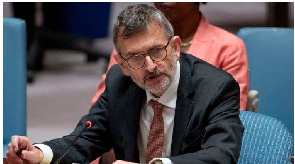Volker Perthes, the UN Special Representative to Sudan, quit his position on Wednesday, ending months of acrimonious relationship with the junta Khartoum over his alleged bias. But Perthes, who delivered his resignation at a session of the UN Security Council, warned that there was no need for UN officials to remain neutral when parties were committing atrocities.
“I have had the privilege to serve as the United Nations Secretary General’s special representative for Sudan for more than two and a half years,” he told an open briefing on Sudan at the Council, New York.
“I am grateful to the Secretary General for that opportunity and for his confidence in me, but I have asked him to relieve me of this duty.”
Antonio Guterres, the UN Secretary-General later tweeted he would accept Perthes’ resignation, arguing the German diplomat had valid reasons to leave the job. Yet Perthes who also headed the UN Integrated Transitional Mission to Sudan (Unitams) revealed the details of the war to a Council that had been largely divided on the punitive steps to take.
Sudan had warned that it could cut ties with Unitams if Perthes addressed the Council session. Khartoum had withdrawn diplomatic credentials for Perthes back in June after the junta accused him of bias and misleading reports on the peace bids in the country, long before the war erupted in April 15.
Sudan did attend, however. But Perthes turned to the Council, the UN’s most powerful organ, “to impress on the warring parties that they cannot operate with impunity, and there will be accountability for the crimes committed.”
“Both sides are arbitrarily arresting, detaining, and even torturing civilians and there are reports of extrajudicial killings,” he said.
“Let me be clear for the benefit of history that regardless of who fired the first shot, both sides were clearly setting the stage for war. The warring parties chose to settle their conflict through fighting, and it is their duty to the Sudanese people to end it.”
The UN Security Council, the 15-member body, was holding a scheduled open briefing, and closed consultations, to assess the impact of Unitams.
But there is a problem. Perthes had been expelled by Khartoum in June, effectively making him a pariah in his own job.
In a letter to Mr Ferit Hoxha, the Albanian diplomat holding the September rotational Presidency of the Council, Sudan’s Permanent Representative to the UN Al-Harith Idriss al-Harith Mohamed said his country will be forced to “review” its position on Unitams as “as Sudan considers his participation in the meeting as deliberate provocation and insult to its sovereignty”.
“If the current situation persists, the relationship between the United Nations and Sudan and will become antagonistic. We do not wish for the UN’s positive engagement with Sudan to be hampered or put on a collision course,” he wrote to the Council on September 9.
“If Perthes takes part in the September 13 meeting, Sudan will distance itself from the meeting and will not participate in it.”
Perthes wasn’t always a fingered man. Appointed in January 2021, he was to leader Unitams that had a mandate of helping Sudan’s transition by setting up its local security agencies and other institutions. But Sudan’s transition never really materialised.
In October 2021, the military engineered a coup, deposing Sudan’s then transitional government of Prime Minister Abdalla Hamdok. On April 15, the Sudan Armed Forces led by Abdel Fattah al-Burhan clashed with the paramilitary Rapid Support Forces led by Mohamed Hamdani Daglo, ending their previous collaboration in the coup.
Perthes had been public enemy for the Sudan Armed Forced and on June 8, Sudan asked the UN Secretary General Antonio Guterres to remove him from the post.
Burhan accused him of “practically misleading” in his reports by saying that there was a consensus on the framework agreement to return the country to normalcy, just before it actually plunged into war.
Sudan also accused Perthes of backing the RSF, saying “without signs of encouragement from several parties, including Perthes,” he would not have "revolted.” Perthes has never spoken in public again since the expulsion, but the UN defended his role.
“Guterres was shocked by the message he received,” UN Secretary General’s spokesman Stephane Dujarric said in June.
"The Secretary-General is proud of the work done by Volker Perthes and reaffirms his full confidence as a special representative," Dujarric added after the expulsion.
Since then, the UN has held two sessions on Sudan, all of which saw Khartoum insist that Unitams be led by someone else.
Wednesday’s meeting is part of consultations on the Secretary-General’s 90-day report on Unitams and Harold Adlai Agyeman, the Ghanaian expert who chairs the 1591 Sudan Sanctions Committee is scheduled to give a quarterly briefing.
Last month, after a session on Sudan, Mr Mohamed argued Sudan was not desiring to have Unitams closed but wanted it to reconsider its leadership.
“We don't have any specific hostility toward Volker Perthes. This is not personal. We need a new perspective to understand what is going on in Sudan,” he said at a media stakeout on August 9 in New York, after the session.
Unitams’ mandate is due to expire on December 3, but the war has brought new dynamics which could feature at the meeting on Wednesday. One area of focus is the increasing humanitarian needs with UN agencies estimated as many as 22 million Sudanese are now in critical need of food. The other issue is the continual fighting in spite of regional bids to secure a lasting ceasefire.
Africa News of Thursday, 14 September 2023
Source: thecitizenafrican.co.ke

















